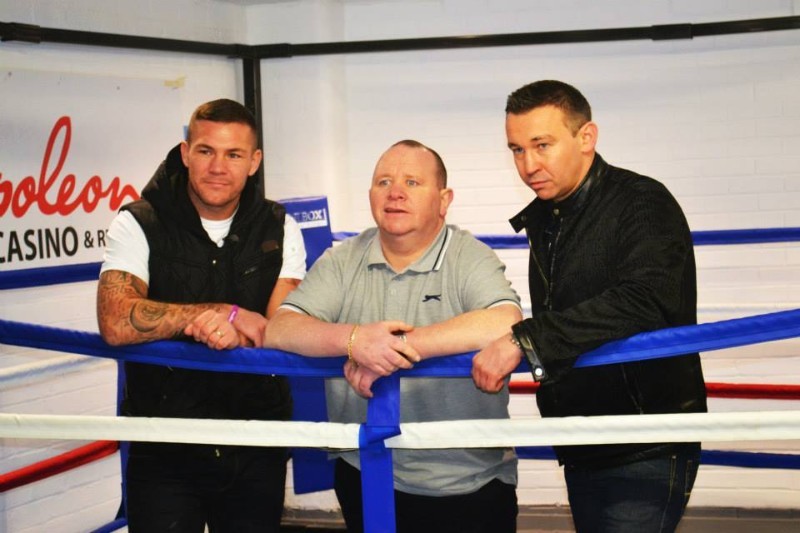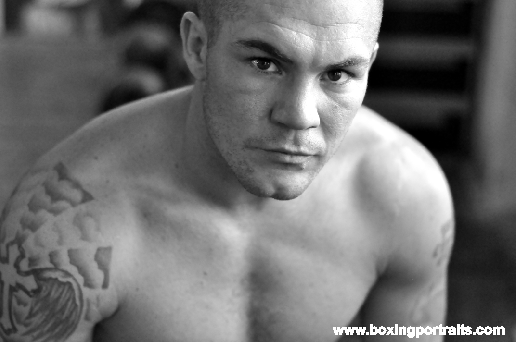Britishboxer’s latest star columnist talks about his new role as a Sky TV pundit, the right and wrong way to criticise and gives his take on Nick Blackwell’s decision to go against doctor’s orders by sparring again, a move that left him hospitalised for the second time this year.
The last time we had a heavyweight title fight in Manchester I was fighting on the bill, but I lost that one and was forced to retire shortly afterwards. That’s why it was different but still great to walk into the Manchester Arena in a different role for Joshua-Molina last week as part of my punditry duties.
To be involved the way I am now, up close and personal, is the next best thing to fighting. You’re as close to the action as you can be without getting punched in the face and getting to do work that isn’t even work. As a wise Irishman once said to me: “If you don’t want to work a day in your life then get yourself a job you enjoy doing and find a way to make it pay”—which is what I’m doing.
I actually prefer the live stuff. I used to do training pieces and Life After Boxing for Ringside and found them harder. I enjoyed it, but they take 10 times longer as you know you’re recording and can make then rectify mistakes, so you make more mistakes that way. When you are doing it live, your body seems to go on autopilot—or protective mode, as I look at it—and you don’t make as many mistakes.
‘People thought I might be too nice for it as I know a lot of people in the trade, the way I look at it is that I try not to slag anyone off as I prefer to give constructive criticism to people. If someone hasn’t done something they should have done or have done something wrong then the way to critiise is to do it in a constructive way and point out what they should have done.’
The live stuff is generally live fights from ringside, you might do some Sky Sports News stuff yet they are few and far between so I do most of my live stuff in front of the action, which suits me. Doing the features is a different bracket, the way I saw it, because you’re coming at it from different angles.
People thought I might be too nice for it as I know a lot of people in the trade, the way I look at it is that I try not to slag anyone off as I prefer to give constructive criticism to people. If someone hasn’t done something they should have done or have done something wrong then the way to critiise is to do it in a constructive way and point out what they should have done.
I don’t profess to know everything—I’m still learning in boxing myself—but I probably know more than someone who is in their early-20s and is just coming through as a pro. I try not to have a go at them, by any means, I just want to help people progress in their careers.
We all make mistakes, me included. I remember my old amateur trainer saying: ‘It’s not a loss as long as you learn from it’. It is the same with mistakes, learn from them and don’t make them again. I try not to be overly critical, you can overdo it and dent someone’s confidence. I do it in a way that means that they can take something from what I’ve said.
There are ways of doing things, I don’t think I’ve been too nice or toed the line. In fact, I’ve probably tried too hard not to be nice to the people who I know. That sounds a bit funny yet I don’t want fans to think I’m being nice because I know the person. The people who know me know that when I commentate or do punditry I don’t try to be nasty, any comments I make are ones that I hope people can take something from.
Everyone thinks you just turn up and have a chat, but there is a lot of groundwork and revision that goes into the role. I’m a bit of a boxing anorak—I’m embarrassed a bit by it at times—yet you cannot claim to know everything and everybody unless you do nothing but research all day. I am in the gym all day training fighters and doing personal training, so getting notes and doing our homework before a show is an important task. It’s not easy, either, as some of the notes we get sent through are as thick as the Bible.
It is nice, too, as I might see a statistic that I’ve not come across before and try to remember to bring it up on the night for a bit of insight. It’s not so much about trying not to make mistakes, it’s about informing the people who are watching and getting the information across to them.
‘I could relate to everyone involved in Life After Boxing because the problems they were still experiencing in their own lives was something I’d been there and experienced myself before. I felt sympathy in a way because I overcome that by being able to do the punditry job whereas a lot of former boxers were still struggling to come to terms with retirement because they missed the buzz, the drama.’

Moore and Ingle in 2014
The first stuff I did was going around the gyms doing training features, which allowed me back into the pro environment that I’d missed after retiring: the banter, the training and the camaraderie. I could do the things involved with being a pro boxer without doing it full-time.
Then I moved on to Life After Boxing, I could relate to everyone involved in that because the problems they were still experiencing in their own lives was something I’d been there and experienced myself before. I felt sympathy in a way because I overcome that by being able to do that job whereas a lot of former boxers were still struggling to come to terms with retirement because they missed the buzz, the drama. I’d found myself in the position to be able to fulfill that in my new job.
It was actually bittersweet for me. I met guys like Michael Gomez, who I’d followed as a fighter, and it is a real struggle for former pros.
People forget that I retired relatively young because my brain scan had changed. It wasn’t necessarily that something was wrong, just that it had changed from how it was before and I had a young family to think of. It didn’t take a genius to figure out that those hard fights and boxing itself was the reason for the change, so seeing people like Paul Ingle for the feature I did on him made it hit home with me even more.
It made me think about the potential of what can happen in boxing and made me realise I’d made the right decision. I met so many people and did so many interviews in gyms that made me think: ‘My life could have been so different if I hadn’t got this job’, so although I enjoyed my work I felt for the fighters who were struggling with retirement.
‘For someone to have an injury as serious as the one Nick [Blackwell] sustained and to spar again is unbelievable to me. He put himself in danger yet the first thing that came into my mind was that it was such a selfish act, you’re not just hurting yourself but also the friends and family who have been through the trauma of seeing what you went through earlier in the year.’
That’s why I was so shocked when I read about Nick Blackwell’s decision to spar and that it had left him in hospital again following his brain injury earlier this year. I have sparred a few times since retiring, but I tried not to do it too much because I didn’t want to get itchy knuckles again—I didn’t want that temptation to fight again, as this was before I got shot.
But for someone to have an injury as serious as the one Nick sustained and to spar again is unbelievable to me. He put himself in danger yet the first thing that came into my mind was that it was such a selfish act, you’re not just hurting yourself but also the friends and family who have been through the trauma of seeing what you went through earlier in the year.
I actually know Nick, we spent time together in Marbella when he came over to spar Matt Macklin; he is such a nice, genuine and level-headed kid. I never expected him to do something like that—it was such a silly thing to do. I don’t know how he is doing, I’ve heard he is recovering OK, but it was selfish of him and he hasn’t given anyone but himself a thought.
I know as well as any that retiring from boxing is really hard to get over, especially if you still have the urge and have had to retire early. I meet boxers and tell them to try not to take it too seriously. It is something we all love, however it is only a sport and your general well-being and life is much more important. There are other aspects of life you can take more seriously, I’m not saying to take it lightly, but don’t take the psychological part of it too seriously—just take it for what it is and move on when the time comes.
I was talking to Nigel Travis when we heard the news, that sparring session would not have taken place in my gym. If someone with that type of injury wanted to do that in my gym they’d be told to take it elsewhere.
One of the first things Colleen, my wife, said was that whoever allowed it should have their licences removed. I’m not sure I’d go that far, but it takes more than one person to be involved in a situation like that and they should be held to account.
That said, I wish Nick well. I really hope that he gets back home and puts the sport behind him rather than doing something stupid again.

